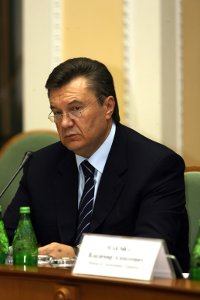Christians Cautiously Hopeful About Ukraine’s New President
 Some Christians are cautiously optimistic that religious freedom will not wane under Ukraine’s new president, Viktor Yanukovych, a pro-Russia leader defeated in 2004 as a result of the Orange Revolution democracy protests.
Some Christians are cautiously optimistic that religious freedom will not wane under Ukraine’s new president, Viktor Yanukovych, a pro-Russia leader defeated in 2004 as a result of the Orange Revolution democracy protests.
“We are convinced that … Yanukovych will protect freedom of religion and contribute to the development of [the] evangelical Protestant churches of Ukraine,” Vladimir Shushkevich, a charismatic Christian and member of Ukraine’s parliament, told Ukraine media. “We are full of hope and belief that efficient and effective reforms of the new president will return Ukraine the chance to be a worthy member of the European community and the Christian world.”
Photo: Ukraine President Viktor Yanukovych
Before the Feb. 7 election, some ministry leaders worried that if Yanukovych were elected, he would follow Russia’s lead and tighten government control over churches and Western missionaries. Christians were heavily involved in the Orange Revolution, a series of protests five years ago that resulted in Yanukovych’s defeat and the election of West-leaning Viktor Yushchenko as president in a third-round vote.
“Because he’s supported by the Russian Orthodox Church, which monopolizes all religious activity back in Russia, it means if he wins, the evangelical church and all expatriate mission activities could be limited as they are in Russia under the current administration,” Russian Ministries Senior Vice President Sergey Rakhuba said in January, according to ASSIST News Service. “It would mean they wouldn’t be able to do their social ministries such as reaching out to needy children in orphanages and helping poor families without an approval from the Orthodox Church.”
But prominent Ukraine pastor Sunday Adelaja, whose God’s Embassy church participated in the Orange Revolution, said Yanukovych received significant support from Christians. Adelaja said late last year God showed him in a dream that Yanukovych would be the next president.
“While some of the churches supported [Prime Minister] Yulia Tymoshenko, we had a good number of churches who believed in the revelation and voted for Yanukovych,” Adelaja said.
He said Shushkevich, who is a member of Adelaja’s church, arranged for him to meet with Yanukovych before the election and the two discussed a law Yanukovych’s Party of Regions had proposed that would restrict the work of the evangelical church.
“They immediately responded, and in a matter of days the law was withdrawn from the parliament,” Adelaja said.
He said Yanukovych’s Party of Regions later agreed to form a spiritual advisory council to advise Yanukovych on faith issues. Adelaja said several evangelicals were nominated to participate in the council. “I definitely believe that the agreement reached between the evangelical churches and the government of Yanukovych will be respected,” the pastor said.
Tymoshenko, leader of the Orange Revolution and Yanukovych’s chief rival, initially disputed the election results but dropped her legal challenge in late February. She was forced to resign as prime minister March 3 when Ukraine’s parliament has passed a motion of no confidence in her government.
Yanukovych has 30 days to assemble a new coalition in parliament and 60 days to form a government. If he is unable to do so, Ukraine will have to hold new parliamentary elections.
In a Wall Street Journal op-ed, Yanukovych said he planned to build a bridge between the East and the West. “Developing a good relationship with the West and bridging the gap to Russia will help Ukraine,” he wrote. “We should not be forced to make the false choice between the benefits of the East and those of the West. As president I will endeavor to build a bridge between both, not a one-way street in either direction.”
Attorney Joel Thornton, who founded the International Human Rights Group and works often on religious liberty cases in Eastern Europe, said he is “hopefully optimistic” about the future of religious freedom in Ukraine.
“The communications I’ve had [with Christians in Ukraine] are hopeful right now,” Thornton said. “We’re going to wait and see where things are going to land.”Â
He said his biggest concern is that Ukraine, like other Eastern European nations, may begin a registration campaign that allows the government to marginalize groups it dislikes. Those groups often are evangelical.
“My concerns are about the political system,” Thornton said. “The candidates have some importance, but ultimately it’s the system that’s the problem. … It’s a problem with how the bureaucrats think. Because of that I don’t know that it really matters who’s there [in the presidency] right now. Ultimately it will. There’s change and softening that occurs in candidates. So there is some benefit of one candidate over another, but it’s really a systematic problem in my mind.”














































